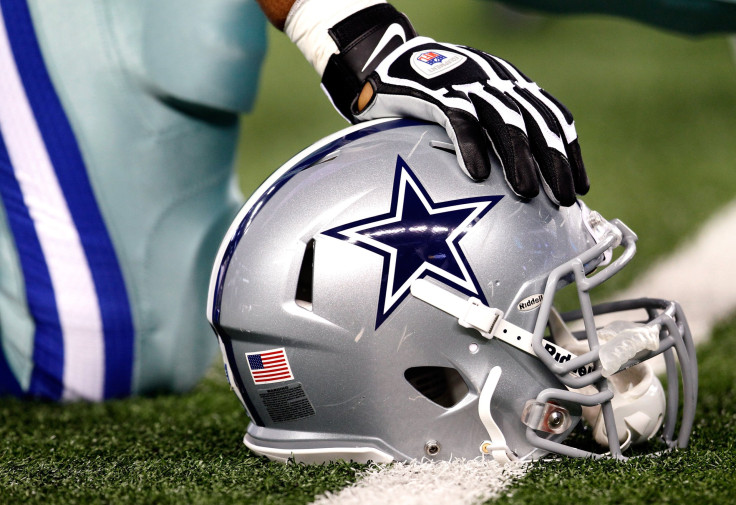Dallas Cowboys Net Worth: How Hot Start Could Bolster Long-Term Brand Success

Even before the 2014 NFL season, the Dallas Cowboys were considered football’s most valuable brand. Now, in the midst of a 5-1 start that included a stunning road victory Sunday against the defending Super Bowl champion Seattle Seahawks, the franchise stands poised to reclaim its self-proclaimed title as “America’s Team” -- and to reap the financial rewards associated with such success in the process.
“They’re starting in the hot dogs, apple pie, Chevrolet land in the core of the U.S.A.,” said Allen Adamson, a sports branding expert and North America region chairman at Landor Associates. “While other cities have football teams, Dallas and Texas are sort of the heartland of football. That said, winning helps any brand. For a sports franchise, it’s the magic fuel.”
From a historical perspective, the Cowboys are considered one of the NFL’s most prestigious and consistently successful teams. They own numerous NFL records, including 20 consecutive winning seasons, 56 postseason games and the most Super Bowl appearances -- eight in all. Bolstered in this success, which was instrumental in Dallas’ adoption of the “America’s Team” moniker in the first place, the Cowboys drew a $3.2 billion valuation from Forbes in August, marking them as the NFL’s most valuable franchise.
That enormous valuation -- one that made the Cowboys one of the most valuable sports franchises in the world, let alone the NFL -- contradicted the mediocre on-field product that Dallas had produced in recent years. But a string of three consecutive 8-8 seasons and a playoff drought that extends back to 2009 didn’t prevent longtime Cowboys owner Jerry Jones from leveraging its billion-dollar AT&T Stadium into corporate sponsorship deals that helped produce an estimated $560 million in revenue in 2013. Meanwhile, the Cowboys’ distinction as the only NFL franchise able to distribute its own memorabilia uniquely positions the team to profit from its global brand success.
“Jerry Jones, by carving out stadium revenue for himself, has been able to do something that no other franchise in sports has done, which is what’s allowed him to be so successful,” said Don Yaeger, former associate editor at Sports Illustrated and CEO at 180 Communications, a media relations firm. “He approached it and realized that a mediocre football team would still allow him to sell a lot of tickets. You give them a good football team, and I could only imagine what the numbers could look like.”
“To me, it’s always been one of the most fascinating business enterprises in sports. It’s right there with Manchester United and Real Madrid -- the on-field product is important, but they’ve figured out how to master all of the other touchpoints to drive revenue.”
In 2014, Dallas’ win-loss record is finally catching up to its success off the field. After years of chasing high-priced free agents and drafting skill position players, Jones, along with his on-field proxy, head coach Jason Garrett, placed a renewed emphasis on the ground-and-pound style that was instrumental to the Cowboys’ dynasty in the 1990s.
Led by running back DeMarco Murray’s record-tying six consecutive 100-yard games, Dallas is off to its best start since 2007. The week-six win over the Seahawks in the unfriendly confines of CenturyLink Field gave Seattle its second home loss since 2012 and firmly established the Cowboys as a contender.
It’s still early in the 2014 NFL season, but Cowboys ticket prices are already on the rise on the resale market. The franchise’s home ticket average stands at $283.22, up over eight percent from the start of the season and well ahead of last year’s average of $264.06, said Chris Matcovich, vice president of data and communications at TiqIQ.
Continued success this season, such as a deep playoff run or a return to the Super Bowl, would push the Cowboys’ revenue and total value to unprecedented heights. “I would bet you [Dallas’ revenue] would be exponentially greater than any other team that would have the exact same level of success. You put the Tampa Bay Buccaneers in that environment, it probably [improves their revenue] 10 percent. My guess is, you put Dallas in that environment, it probably triples that, because they start ahead of everyone else,” said Yaeger.
Furthermore, the return to winning form is crucial to maintaining the long-term health of the Cowboys’ brand. Dallas’ value was resilient through a few subpar seasons, but even a strong brand would suffer in the face of sustained mediocrity.
“They’re more immune than other brands because of the huge fan base they have, but no one is immune to coming in second place,” Adamson said. “Everyone can weather a storm, and [the Cowboys] can weather it better than most, but no one is immune to it. They could have probably survived another one or two tough years, but ultimately, winners do better.”
© Copyright IBTimes 2024. All rights reserved.






















